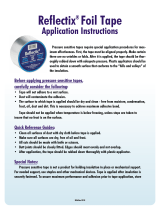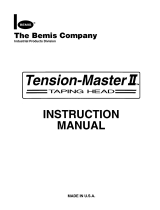
5
Installation
1. The box conveying system must positively
propel the box in a continuous motion, not
exceeding 0.40 m/s [80 feet per minute], past
the taping head assembly since the box motion
actuates the taping mechanism.
2. If a pusher or cleated conveyor is being used,
steps should be taken in the conveyor design to
prevent the pusher from contacting the
applying or buffing roller arms resulting in
damage to the taping head.
WARNING – Taping heads are equipped with an extremely sharp tape cut-off knife. The
knife is located under the orange knife guard which has the "Warning – Sharp Knife" label.
Before working with the taping heads or loading tape, refer to Figures 3-1 and 3-2 on page 6 and
identify the knife location. Keep hands out of these areas except as necessary to service the taping
heads.
Receiving And Handling
After the taping head assembly has been
unpackaged, examine the unit for damage that might
have occurred during transit. If damage is evident,
file a damage claim immediately with the
transportation company and also notify your 3M
Representative.
Installation Guidelines
The taping head assembly can be used in
converting existing or in custom made machinery.
It can be mounted for top taping or bottom taping.
Refer to box size specifications on page 3, and
Figure 2-1 on page 4, for the following points in
making such installations:
4. Mounting studs are provided with the taping
head, but special installations may require
alternate means for mounting.
5. Box hold-down or guide skis should be provided
and the taping head mounted so that the side
plates are 6 mm [1/4 inch] maximum away from
the ski surface on which the box rides.
CAUTION – Taping head weighs
approximately 7.2 kg [16 lbs]
without tape. Remove tape roll before
removing taping head from machine to
minimize weight. Use proper body
mechanics when installing or removing
taping head.
Tape Leg Length
Taping heads are factory set to apply standard
70 mm [2-3/4 inch] tape legs. The heads can be
converted to apply 50 mm [2 inch] tape legs if
desired but both upper and lower heads must be set
to apply the same tape leg length. See
"Adjustments – Changing Tape Leg Length From
70 to 50 mm [2-3/4 to 2 Inches]", page 13.
Also, the conveyor speed at which the product
moves through the taping heads, affects the leading
and trailing tape leg length. See, "Adjustments –
Leading Tape Leg Length Adjustment", page 13.
Tape Width Adjustment
Taping heads are factory set to apply 48 mm [2 inch]
wide tape. If it is necessary to align the tape or to
apply narrower tapes, refer to "Adjustments – Tape
Web Alignment", page 11 for set-up procedure.
Note – AccuGlide™ II STD taping Heads are
supplied with a buffing arm guard. This guard
may have to be removed to install the taping
head into some older design 3M-Matic™ case
sealers. If this is the case, remove the four
guard mounting screws, remove the guard and
then install the taping head.
3. Figure 2-1 illustrates the typical mounting
relationship for opposing taping head
assemblies to allow taping of box heights down
to 90 mm [3-1/2 inches]. To tape box heights
down to 70 mm [2-3/4 inches], the taping
heads must be completely staggered so only
one tape seal is being applied at one time.


























